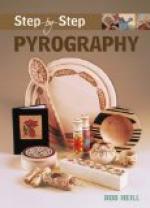Lady Philippa had ruled her father’s house when she was a girl of fourteen, and she could have taught the people a different way of living. She knew how to raise and care for the great variety of poultry, water-fowl, pigeons, hares, fish, and delicate small birds of many kinds, such as some of their neighbors had and the southern provinces of France enjoyed in even greater abundance. But Lady Ebba would have none of it. Fowls had to be carefully tended, protected from foxes, hawks and other enemies; the fierce half-wild hogs could take care of themselves. All that they needed was a peasant herdsman with a dog to keep them together and see that thieving neighbors did not help themselves. There was more food in one hog than in a whole covey of game birds, to say nothing of the trouble of catching and cooking the birds.
Neither did the old dame approve of tapestried walls, cups and bowls of silver, gold and enamel, flower-gardens or delicately-made dishes. Fortunately her daughter-in-law’s herb-garden was not wholly under the ban. It contained herbs useful in medicine, and God has ordained that many useful plants are also beautiful in their season. Sage, balm, caraway, monk’s hood, thyme, thrift, mint, and other plants therefore dwelt contentedly in a sunny nook of the castle. The Provence roses, lilies and violets needed little care, and having once taken root were not ousted. One reason may have been that on special occasions perfumed water was offered to some guest of importance, for the washing of the hands after eating. By her manner though not in words Lady Ebba conveyed the idea that it was as well to have some one in the house who had time and taste for such things. The embroidering of tapestries and rich robes, and the repairing of such vestments as had come to mending, might also be done by the person who had time for it.
The pleasantest hours in Eleanor’s day were those that she spent with her mother in the tapestry chamber. Whenever the weather would allow it they sat there during the sunny hours of the day, and if Sir Walter was at home, or it was very cold and some important piece of work must be done, they could have a brazier of charcoal to keep them warm. There was no fireplace in the room.
It was not a very large room, and it was stone-floored and stone-walled. It was Lady Philippa’s bedchamber. The bed was oak, built into the wall like a cupboard, and almost black with age. There were carved doors of oak that could be shut, making it look like an armoire, but these were usually open, displaying pillow-slips of fine linen and a linen coverlet, spun, woven, and embroidered with black silk, by the lady herself. On the floor were strewn rushes and fragrant herbs. There were two straight carved chairs of old oak, an ivory footstool and a small table which held a few books and an ebony work-box inlaid with ivory, and writing materials. Two carved chests set one on the other served as wardrobe. As for washing conveniences, these were brought in as they were needed, by the knight’s body-servant or the lady’s own maid. The real luxury in the room was the window, which was more than twice the size of the narrow slits that lighted the great hall, and opened to the south. On pleasant days the sun looked in early and lingered late, as if he loved the room and its gentle mistress.




